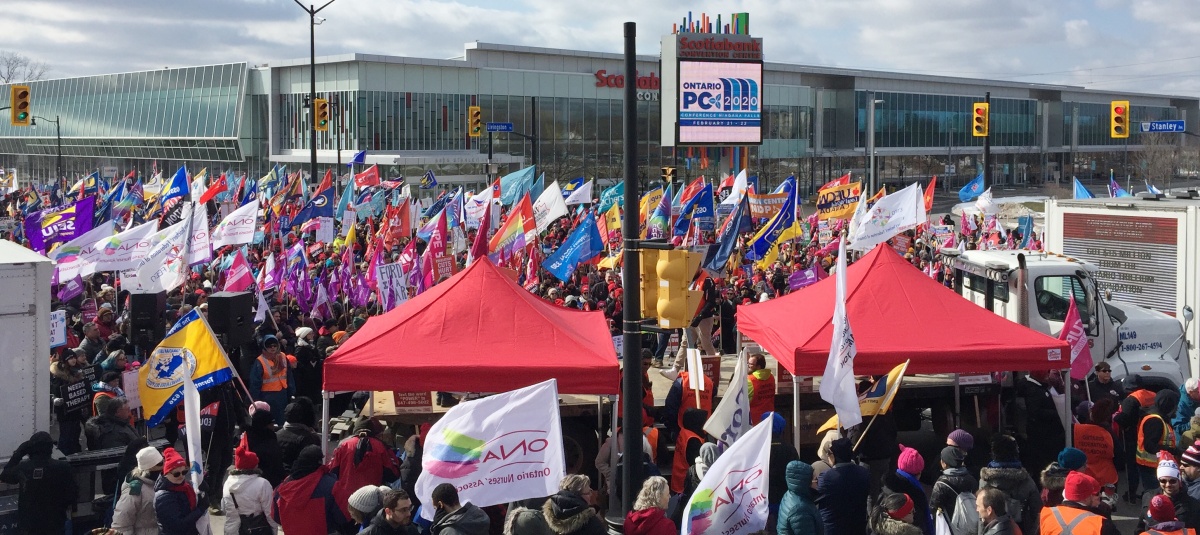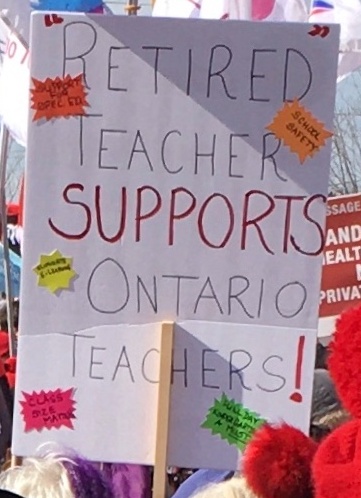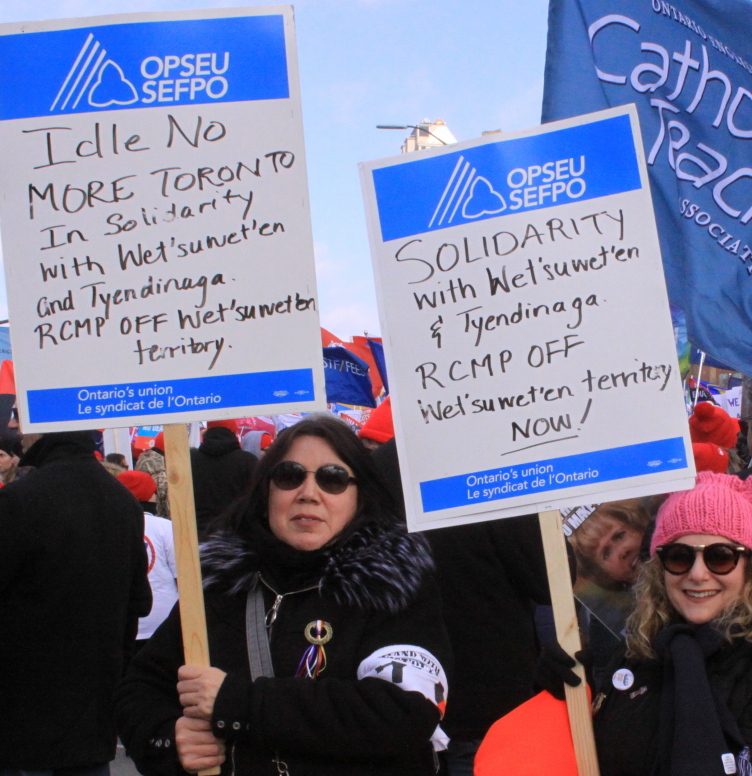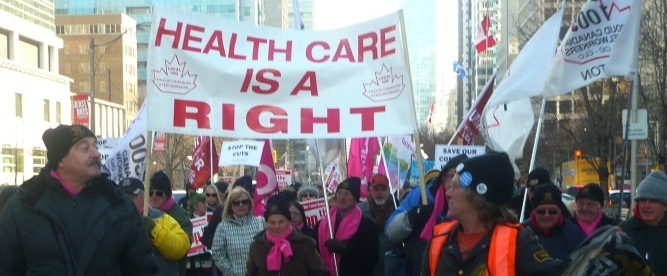|
February 27, 2020
Ontario Working People Reject Ford Government's Agenda
Educators Stand as One to Say No!
to Anti-Social Attacks on
Education in Ontario
- Laura Chesnik -

Education workers participate in large numbers in rally in Niagara Falls against Ontario PC government's cuts, February
22, 2020.
• Mass Demonstration at
Niagara Policy Convention of Progressive Conservatives
• What the Situation of
Personal Support Workers Is Telling Us
- Rolf Gerstenberger, Co-chair of the Hamilton
Health Coalition and
former President of United Steelworkers Local 1005
Six Months Closure of Department of Obstetrics in Shawville, Quebec
• No! to the Closing of Fundamental Health Services
- Louis Lang
Ontario Working People Reject Ford Government's Agenda
- Laura Chesnik -
 Educators from across Toronto surrounded Queen's Park with a mass
picket line, Educators from across Toronto surrounded Queen's Park with a mass
picket line,
February 21, 2020.
On February 21, education workers across Ontario held a
coordinated walkout and withdrawal of their labour. Even though
once before, during the political protest of 1997, all unions
representing teachers went on strike at the same time, this was the
first time in Ontario’s history that teachers and education
workers from all four unions set up joint picket lines.

Aerial view of picket line around
Queen's Park.
|
The spirit on the lines reflected the significance
of this act of unity. On many lines members of the various unions mixed
and mingled on staggered shifts, meeting one another, catching up with
old friends and sharing experiences. Despite different flags and
positions in education, they stood as one for their working
conditions --
students' learning conditions.
In Peel Region, parents and students joined with staff
represented by OSSTF Peel, ETFO Peel, OECTA Dufferin-Peel and AEFO to
form a 20,000-person-strong picket line 30 kilometres in length along
Highway 10 extending from Caledon through Brampton and Mississauga to
Lake Ontario. They
documented it in a
video titled I'm on the Line for #Strike102030. To see the video click
here.
In Kitchener-Waterloo members of all four unions filled
the square in front of Kitchener City Hall, showing the sheer numbers
of people involved in educating the youth and adult students in that
area.
In Toronto 30,000 education workers and their supporters surrounded Queen's Park, making it Educators' Park for the day.
Everywhere across the province those who provide
K-12 and adult and continuing education affirmed their collective No!
to the government's attempts to blame them for the problems in
education in order to attack their working conditions.
This week selected districts of OSSTF will engage in a
full withdrawal strike on Friday, February 28. School boards affected
can be seen here. While
AEFO was also planning a full strike day this week it has announced
that a forecast of freezing rain has resulted in it being postponed.
ETFO has given the government until March 6 to negotiate an acceptable
deal or its members will enter a new phase of strike actions. OECTA has
paused its rotating strikes as it had been negotiating with the
government and Catholic trustees’ association up until February
24 when talks broke off. In a February 24 statement, OECTA
president Liz Stuart said:
[...] After the Minister of
Education spent the weekend making baseless, inflammatory accusations
about Catholic teachers and our Association, his bargaining team held
firm to their agenda to take resources out of the classroom. At times,
it seems they have no real intention of negotiating an agreement.
Our Association remains
committed to our goal of reaching a fair agreement at the bargaining
table, and we will await word from the mediator as to whether she
believes further negotiations would be worthwhile. However, we will not
tolerate the government’s disrespect for our members, or their
insistence on making permanent cuts to publicly funded education. While
our administrative job action continues, OECTA will also be considering
options for further strike action.
Ottawa; Kingston
 
Peterborough

Toronto



Peel Region

Hamilton

Kitchener-Waterloo


Stratford

Windsor


 
Owen Sound

Northern Ontario

Vancouver, BC teachers in solidarity with Ontario teachers -- Red for Ed



The mass action held outside the policy convention of
the Ontario Progressive Conservative Party in Niagara Falls on February
22 testifies to the broad opposition to the agenda of the Ford government. Close to 5,000 people from different parts of Ontario
converged on Niagara Falls to take part in the "People vs. Conservative
Cuts" rally to denounce the anti-social agenda of the PC government.
The largest contingent was that of education
workers who had just carried out a massive province-wide strike the day
before. Large contingents of health care workers and other public sector
workers were also present as were contingents of steelworkers from
Hamilton and auto workers.
The rally opened with an appeal from speakers that
the working people of Ontario continue to stand with the political
protests of the Indigenous peoples against the illegal invasion of
Wet'suwet'en territory by the RCMP. One speaker made it clear that it
is a fight against injustice.
Speakers that followed, including representatives of the
autism community, social workers, advocates for health care and
post-secondary students, opposed the government's attacks on the most
vulnerable. Among those who also spoke were Ontario Federation of
Labour President Patty Coates and presidents of the Ontario education
unions, including the Canadian Union of Public Employees (CUPE) Ontario
whose 55,000 education worker members are not on strike but have been
engaging in solidarity actions with their striking colleagues.

 

 
  
 
  
 
 

- Rolf Gerstenberger,
Co-chair, Hamilton Health Coalition and former President
of
United Steelworkers Local 1005 -

USW Local 1005 has been holding weekly meetings
every Thursday since 2003 to discuss matters of importance to the
workers. At our Thursday meeting on February 13 we had a lively
discussion on the situation facing personal support workers (PSWs) in
Ontario and what their plight is telling us.
Local 1005
President Gary Howe asked me to report on the situation, which is well
documented in the study that was commissioned from the Ontario Health
Coalition by Unifor.[1]
The Coalition did a tour of various cities, including Hamilton, and
held press conferences around the province to
popularize the results.
At the Thursday meeting we dealt with some of the
issues raised in that study and at the press conference held in
Hamilton on February 10. Two weeks earlier at our meeting we also
addressed the situation and many workers spoke of their own experiences
of trying to put someone into long term care, the struggle it entailed
and the many
problems they had to deal with once they were there.
Right now, about 80,000 people are in long term
care in Ontario with 30,000 people on waiting lists, which can result
in a delay of five years or more. Long term care is residential care in a
home for those who can no longer function on their own due to medical
conditions that require assistance. In the 2018 Ontario general
election, the parties
promised to create more long term care homes. Doug Ford himself
committed to building homes for 15,000 people within five years.
Whether it happens or not, the problem is that the system does not have
enough personal support workers to take care of the 80,000 people
already in care. According to the report, even if a seniors' home is
staffed
according to the current rules, the homes are short-staffed because no
one is available to replace staff when sick, on holidays or on days off.
 Staff
have to run from one room to the next to try
to bathe people, maintain them, and the situation just snowballs. This
is bad enough in terms of the patients, but then personal support
workers begin to be abused from all sides because of the situation.
They are forced to work double shifts. They have no days off. They do
not know their
schedules ahead of time. Many are part-time workers juggling two
long-term care jobs and having to balance schedules, disrupting their
lives.
Listening to what these personal support workers in long term care
homes
say about their working conditions, they are a nightmare. Staff
have to run from one room to the next to try
to bathe people, maintain them, and the situation just snowballs. This
is bad enough in terms of the patients, but then personal support
workers begin to be abused from all sides because of the situation.
They are forced to work double shifts. They have no days off. They do
not know their
schedules ahead of time. Many are part-time workers juggling two
long-term care jobs and having to balance schedules, disrupting their
lives.
Listening to what these personal support workers in long term care
homes
say about their working conditions, they are a nightmare.
We steelworkers recalled that in our industry it
took a long fight just to achieve regular schedules. If you have no
protection of regular shifts, the company abuses you. Without this
protection, you do not know beforehand what shift you are working or
your days off, causing havoc in your life. We fought for years to have
our schedules set, to
know our work schedule in advance. And if the company violates the
schedule, a penalty exists such as paying time-and-a-half, and other
measures to enforce the rule.
The other sector with a huge problem is home care.
This is where hospitals say they are overcrowded, blaming those they
call "bed blockers" who do not need hospital care and should be in
long-term care but are stuck in the hospital because no long-term care
beds
are available. The "solution" is that while the government
promises to eventually build more long-term care homes, they want more people to go
into home care, whether it is suitable for them or not. The authorities
blame the people for overcrowding the hospitals and use this excuse as
justification for putting vulnerable people and the workers who look
after them into unacceptable conditions.
Home care is said to be the cheapest because you
are in your own home, but require some care, and personal
support workers are sent to take care of you at home. That is what is
being said, but of course it is cheaply done on the backs of workers
and those needing care. Wages are lower for home care workers, with
many of
them barely making minimum wage. Their travel time is not paid. They
have to use their own vehicles. They are on call, running from one home
to the next with no support.
The report puts forward a number of demands to
address the crisis in long-term care. One of them is to guarantee four
hours of care per day for the patients. That means four hours in the
course of a day, time for a bath and time to deal with medical
problems, where personal support workers and nurses can effectively
provide four hours of
care a day. That is one of the goals they are raising to change the
situation for the better. Currently it is nowhere near that level.
We also discussed at our meeting an article in the
local paper, which explains that hospitals do not receive proper
funding for medical equipment. They are forced to fundraise, do
lotteries and beg for charity through donations and contributions from
philanthropists. Hospital equipment is not covered by government
funding. I said that when
the army needs jets or tanks, then they should have a bake sale or a
lottery and raise money from people who want to support the military.
How can hospitals or any modern enterprise be run like that?
A year or two ago a petition was circulated in Ontario
asking who supports a cut in funding for hospitals. Of course 99.99 per
cent of the people said No!,
they do not want to cut funding for hospitals yet that is exactly what
is being done. When these parties get into Parliament or Queen's Park
all of the sudden they find all kinds of excuses to cut funding for
health care and other social programs, such as Ford is doing to
education. The Ontario Liberals, before the Ford government came to
power, froze hospital funding for 10 years, which is actually a major
cut because of the combined factors of an aging population, increased
needs, greater population and price inflation.
Cuts to health care funding are the demand of an
important section of the financial oligarchy and that is what rules in
parliament and legislatures. Besides, the people who are in power in
the legislature figure that they are going to be OK. They have money,
they have connections, they will not go into these long-term care
homes, which lack
resources and workers. They are making decisions that impose conditions
on others that they themselves will not experience.
When discussing what the situation of personal
support workers is telling us, we pointed out at our meeting that people
are grappling with why something as important and basic as health care,
which is such a priority for the people, is not dealt with seriously by
those in power in the parliament and legislatures. They do precisely
the opposite
of what people want, which shows that the people are not empowered and
that the lack of empowerment is the fundamental problem facing society.
The present political system blocks the people from solving the
problems they and society face. What modern political forms are
necessary to turn the situation around to empower the people
politically? That is a problem worth taking up as a priority as it lies
at the root of all other problems.
Note
1. Caring
in Crisis: Ontario's Long-Term Care PSW Shortage - Report &
recommendations from the front lines across Ontario - Commissioned from
the Ontario Health Coalition by Unifor - January 2020

Six Months Closure of Department of Obstetrics in Shawville, Quebec
- Louis Lang -

About 20 people drove close to two hours from Shawville
and other Pontiac towns to demonstrate Monday morning, February 24, in
front of the Hull hospital in Gatineau, Quebec to express their anger
at the fact that the Outaouais Integrated Health and Social Services
Centre (CISSSO) has announced that as of February 21, the department of
obstetrics at the Shawville hospital will be closed for six months. The
department was a service that was essential to women from various
Pontiac towns such as Fort-Coulonge and Mansfield-et-Pontefract. With
this closure, women awaiting the birth of their child will no longer
have a hospital nearby they can go to in case of an emergency and will,
in some cases, have to drive two hours to have their baby.
 The
CISSSO announced that it was closing the department for safety reasons,
which the Minister responsible for the Outaouais, Mathieu Lacombe,
endorsed. The issue of safety is raised because, among other factors,
there are only three nurses on hand in the department, when the number
of nurses required to provide complete and safe services in obstetrics
is 12. Quebec nurses' medieval working conditions are a key factor in
the closing of the department which means it is closely related to the
concerns raised by workers in the health sector who have been stating
for years that to improve the services in health care there must be an
improvement in the working conditions of those who provide the services. The
CISSSO announced that it was closing the department for safety reasons,
which the Minister responsible for the Outaouais, Mathieu Lacombe,
endorsed. The issue of safety is raised because, among other factors,
there are only three nurses on hand in the department, when the number
of nurses required to provide complete and safe services in obstetrics
is 12. Quebec nurses' medieval working conditions are a key factor in
the closing of the department which means it is closely related to the
concerns raised by workers in the health sector who have been stating
for years that to improve the services in health care there must be an
improvement in the working conditions of those who provide the services.
Women in the Pontiac have expressed that they are
worried that not only the department of obstetrics may never reopen,
but that other services could also be affected. The people
demonstrating received broad support from people going in and out of
the hospital. Demonstrators stated that they would continue to hold
actions until the problem is resolved and the service restored. Their
preoccupations and demands deserve the support of everyone. On Sunday,
March 1 a demonstration will be held at 2 pm in front of the Shawville
Hospital.
Ongoing information on the struggle can be obtained at La Voix Du Pontiac on Facebook, and with hashtag #obspontiac.

(To access articles
individually click on the black headline.)
PDF
PREVIOUS
ISSUES | HOME
Website:
www.cpcml.ca
Email: office@cpcml.ca
|





















 The
CISSSO announced that it was closing the department for safety reasons,
which the Minister responsible for the Outaouais, Mathieu Lacombe,
endorsed. The issue of safety is raised because, among other factors,
there are only three nurses on hand in the department, when the number
of nurses required to provide complete and safe services in obstetrics
is 12. Quebec nurses' medieval working conditions are a key factor in
the closing of the department which means it is closely related to the
concerns raised by workers in the health sector who have been stating
for years that to improve the services in health care there must be an
improvement in the working conditions of those who provide the services.
The
CISSSO announced that it was closing the department for safety reasons,
which the Minister responsible for the Outaouais, Mathieu Lacombe,
endorsed. The issue of safety is raised because, among other factors,
there are only three nurses on hand in the department, when the number
of nurses required to provide complete and safe services in obstetrics
is 12. Quebec nurses' medieval working conditions are a key factor in
the closing of the department which means it is closely related to the
concerns raised by workers in the health sector who have been stating
for years that to improve the services in health care there must be an
improvement in the working conditions of those who provide the services.